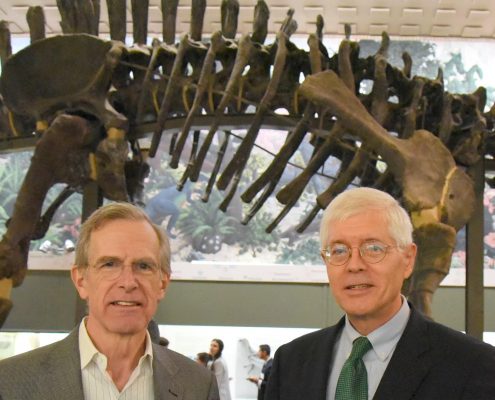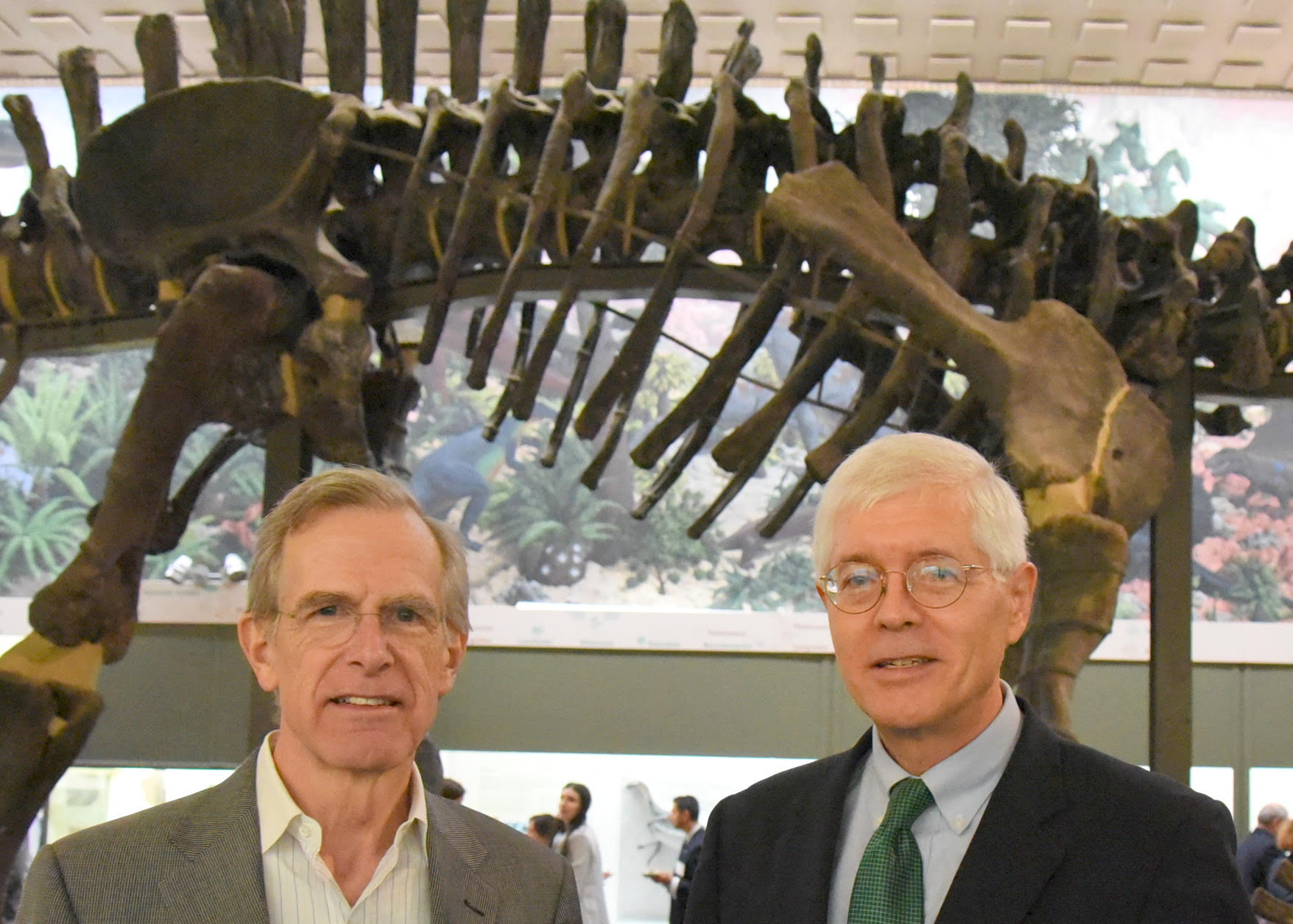Two Classmates Organize the Yale Environmental Sustainability Summit

Credit: Courtesy of Peter Otis/ peterotisphotos.com
In 2015 Yale launched the Yale Environmental Sustainability Summit (YESS) to explore environmental sustainability and related subjects. The goal was to provide a forum for change makers from diverse spheres to share effective models of sustainability and build skills for action. YESS aspires to catalyze the Yale alumni community to take a fresh look at global “unsustainability” and cultivate solutions that connect people and priorities.
Two of our classmates, Tom Emmons and Derry Allen, participated in the first YESS gathering and then agreed to be on the organizing committee for the second one in 2017. Derry worked for the EPA for 37 years before retiring in 2015, and Tom has devoted his career to financing in the energy sector – initially oil and gas and now wind and solar. They were interviewed by another classmate, Philip Garvin.
Philip: Back in the sixties, I don’t recall ever hearing the word “sustainability”, so I’m guessing that neither of you were studying this subject when we were at Yale. True? Did you have any interests – back then – that evolved into a passion for the environment and alternative energy?
Tom: Maybe it’s a stretch to say that I was an active Boy Scout and loved to hike and camp. I think that gave me a respect and love for the environment, and an appreciation for its vulnerability to man’s neglect.
Derry: When we were in college and for a while afterwards you wouldn’t have heard the word “sustainability.” The 1960’s were a time of awakening on environmental issues. The first Earth Day and the passage of many of the most important U.S. environmental laws happened shortly after we graduated. However, the focus tended to be on pollution control and not so much on the broader topic of sustainability.
It was only in the late 1980’s that many members of the public began to realize that the way the world has been using natural resources and dumping waste into the environment severely challenge the ability of the earth to accommodate these activities. The word “sustainability” entered the popular lexicon in 1987 when a UN panel studying the environment and development explained that “Sustainable development is development that meets the needs of the present without compromising the ability of future generations to meet their own needs.”
Yale has long been a leader in sustainability. The university formed the School of Forestry in 1900 and renamed it the School of Forestry and Environmental Studies in 1972. Today schools across the university are world leaders in many aspects of sustainability.
My own interest in environment and sustainability began in nature – like Tom’s interest did – and has mirrored these developments. I grew up spending a lot of time outdoors and spent six summers during school and college canoeing in the wilderness of Quebec. My idea of clean water comes from the wilderness, where you can dip your cup in the water and drink it. At Yale, I majored in American Studies. For four years I also spent nearly every afternoon in the fall and spring outdoors on the Housatonic River with the Yale Crew. My deeper understanding and involvement with environment and sustainability came after college and was closely related to developments that occurred in the public sphere.
Philip: Derry, what lured you into a lifelong career at the EPA?
Derry: What lured me to EPA in 1978 was the opportunity to combine my business school education and my government experience with my interest in the environment. I, like many others at the time, was concerned about the harm that pollution was doing to human health and the environment.
What kept me at EPA for 37 years was the excitement and challenge of working on the agency’s mission with a highly talented group of people and the evolution of approaches. When sustainability became a subject of discussion it caused many of us to see our work in a new and even more important light.
Philip: Tom, you were in oil & gas financing. How did you become interested in Wind & Solar?
Tom: My work in energy finance began in the 70’s, when oil and natural gas were dominant – remember the gasoline shortages? Oil and gas financing was synonymous with energy finance. But in 2003, wind and solar power started to become viable, and began to replace natural gas and coal as the leading fuel for electricity generation. I took the opportunity to join and advance this cutting edge movement.

Philip: You met up at the first Yale Environmental Sustainability Summit (“YESS”). What got you there and what was appealing about it?
Tom: I got involved first as a panelist in 2015 through the School of Forestry and Environmental Studies (a co-sponsor along with SOM, etc.), and then volunteered to contribute ideas for topics at the next YESS in 2017. (Mark your calendars for Nov. 2019.) It’s a great event – Yale-affiliated environmental activists of all ages invite other environmentalists to New Haven to energize the movement.
Derry: The first YESS was in 2015, just six months after I retired from EPA. I thought it would be a good way to keep in touch with what was going on in the field, learn about some new things that would broaden my understanding, and make interesting contacts, especially because of Yale’s leadership in the field. The conference did all that and more. It solidified for me a new relationship with the university, one that is based on an interest in sustainability that I share with alumni, faculty and staff from the university who are of all ages and are from all the different schools.
Philip: Why did you join the organizing committee of the second YESS and what difference do you think you made? And will you participate in the third YESS?
Tom: I have been involved in the effort for a while (at least since renewable energy was viable in the US) and I offered up my ideas about relevant topics, some of which were incorporated in the program.
Derry: At the end of the first YESS the organizers asked for volunteers to help organize the second YESS in 2017. I’m glad I did. I had a wonderful time working with other members of the committee, shaping the agenda, organizing several sessions and recruiting speakers. I have agreed to work on the third YESS in 2019. It will be open to all alumni and will likely be just six months after our 50th reunion. You don’t have to be an expert in environmental policy to participate. As Tom has said, we hope to see many of our classmates there!
Philip: Is wind & solar here to stay? Is coal, oil and gas on the way out? Is the current administration going in the wrong direction? Should my next car be electric or at least hybrid and should I put solar panels on my house?
Tom: Yes, yes, yes, and yes. The US (and world) is in the process of a fundamental transformation from fossil fuels to renewable energy. In 2017, wind and solar power plants accounted for over 90% of all new generating capacity build in the US, net of retirements of fossil fuel plants.
The current administration is missing the opportunity to contribute to this momentum, by not implementing the Clean Power Plan and by not supporting the Paris Accord. But fortunately, the few ways that federal government programs do support renewable energy (e.g., tax incentives) were left in place by Congress, in spite of the administration’s stance.
In addition to moving to renewable energy for power generation, the world economy is shifting to electric power from fossil fuels (gasoline) for road transportation. That means that the internal combustion engine is on the way out. For example, India, Norway, France, and the UK have banned, and 10 other countries have mandated reductions of internal combustion engines in cars by target dates.
Derry: Wind and solar are growing and are here to stay. They need to be a key part of an economy that helps us thrive within the physical limits of the earth – as a source of natural resources and a sink for waste and pollution. We need to find ways to fulfill human needs while creating little or no pollution in the first place. The major question about wind and solar is what we will do to help them grow most quickly and intelligently in the future.


Tom and Derry: Please include me in your plans and activities in the future. Thanks, John Nelson
john.nelson@wallstreetwithoutwalls.com
John: Certainly!
Derry
Tom and Derry: Do either or both of you have any interest in writing a piece for the 50th Reunion ClassBook on this topic, or any other topic related to the environment? Perhaps you might already have something in the back of your desk drawer. Thanks, JP (BK ’69)
jeanpierrejordan@sbcglobal.net
JP: Sounds interesting. I will follow up with you off line. I would also be interested to know if others would like to contribute to such a piece. I suspect that we have many classmates who have participated in one way or another in the remarkable events of the past 50 years.
Derry
Let’s bring John Nelson in on our discussion of ideas for the Booklet and/or program.